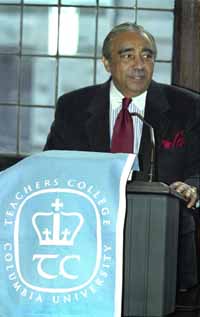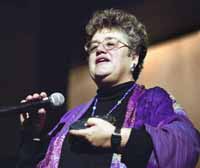Teachers Learn To “Wage Peace” In Difficult Times
"The Art of Conflict Resolution: Waging Peace in Our Global Classrooms," TC's fourth annual conflict resolution conference, brought together a diverse group of educators-from urban schoolteachers to suburban superintendents-to learn how to "wage peace," whether in a large school district or within a single school building. Participants in the March 8th conference were provided with lessons, workshops, and materials to apply conflict resolution and peace education skills in their professional lives.
The idea behind the conference originated with Kate Unger, Founder and Director of TC's New Teacher Institute (TCNTI). Earlier in her career, as an assistant principal at a troubled suburban high school, Unger had responsibility for keeping the peace, and the experience she gained helped inspire her later work with new teachers at TCNTI. Four years ago, Unger began a collaborative effort with TC's International Center For Cooperation and Conflict Resolution (ICCCR) to jointly develop and sponsor a conference to teach conflict resolution skills, and the conference has become a yearly event.
Speaking to Inside TC shortly before the conference, Unger noted that there is an ongoing perception of conflict resolution and peace education as enrichment offerings, rather than as content to be woven throughout the K-12 curriculum-something she feels is needed, especially now. "The world changed for us after September 11th," said Unger. "Our classrooms are fractals of our society, and we feel the effect of everything that is going on around us. Because of this we have to ask, ‘How do we begin to talk about pedagogies of peace? How do we develop the capacity in students to do peer mediation, work against racism, and help create peace?'"
The conference's plenary speaker was Eric Cooper, Ed.D., Executive Director of the National Alliance for Effective Education for the Council of Great City Schools. Cooper focused on lessons learned from his experiences working with children in Harlem-primarily, African-American boys "labeled as ‘special ed.'" In his remarks, he noted the sharp "disproportionality" endemic in urban education, where children of color are under-represented in the better-quality preschools, under-represented in advanced placement courses, and over-represented in special education classes. "The achievement gap reflects a lack of political will on the part of stakeholders," said Cooper. "You cannot look at the lack of education and separate it from what is happening on the street, and in society."
MILITARY EXPENDITURES VS. FUNDING FOR EDUCATION, HEALTH CARE
Looking at the larger national picture, Rep. Charles Rangel (D-NY), speaking during the conference luncheon, criticized the build-up to war in Iraq, and pointed out that as military expenditures continue to spiral upward, the government is allowing education mandates to go under-funded. Rep. Rangel, who is ranking member of the Committee on Ways and Means, noted with irony President Bush's intention to use Iraq's oil to pay for education and health care in a post-war Iraq, while lacking a plan to adequately fund education and health care in America.
"The interest on the national debt is the second-highest federal expense after military spending," Rangel said. "In addition, you're looking at $100 billion if there is war in Iraq, another $100 billion for occupation-and, on top of this, the administration wants to have a $674 billion tax cut." He added: "If we look at education, we set the standards, but without the dollars, they can call it ‘No Child Left Behind' but the money will be left behind…the way you kill a program is by having no money for it." Rangel, who is also Deputy Democratic Whip, is currently in his 17th terms as Representative for the 15th Congressional District.
The day's workshops were split into morning and afternoon sessions that offered an introduction to conflict resolution, followed by discussions and role-playing that demonstrated how to apply conflict-resolution skills. At day's end, the Rev. James A. Forbes Jr., Senior Minister of the Riverside Church, delivered a heartfelt talk that, in part, spoke about a teacher's responsibility to plant seeds of inspiration in his or her students. "To the teachers I say: it will take a little while for your work to be manifested. In time, you will determine the nature of conflict, or the resolution of conflict, in the future," Forbes said.
"I like to look at every child as a philanthropist-each one has something worthwhile to give to the community. Every child has a song within; my job as a preacher, and yours as a teacher, is to release that song."
Published Monday, Apr. 7, 2003

